
Do you know what drives sales?
Word-of-mouth marketing is free advertising and comes in the form of glowing recommendations from the people you trust the most. Word-of-mouth’s online counterpart is user-generated content (UCG).
Not sure what UGC is or how to incorporate it into a successful marketing strategy?
You’re in the right place.
Below, we’ll explore the best user-generated content examples from the world’s biggest brands and why each one works so well.
By the time you’re done reading this post, you’ll have dozens of actionable ideas for your UGC strategy and a clear idea of how to use social proof to boost your sales, increase trust, and create a hyper-engaged community of loyal customers.
What Is User-Generated Content?
User-generated content is any combination of photos, videos, and text created by people rather than a brand.
From product reviews on sites like Yelp to posts on social media, UGC generates powerful social proof that can lead to more sales and increase trust without any direct involvement from the brand.
What Are the Benefits of User-Generated Content?
What’s the deal with UGC? What makes it one of the best marketing tools at your disposal?
It’s buying power.
- 56 percent of consumers are influenced by images and videos from social media when shopping online.
- 79 percent say UGC highly impacts their purchasing decisions, while influencer content has only a nine percent sway over their wallets.
- 80 percent of consumers are likely to purchase a product online if its website features videos and photos from real customers.
However, the benefits of user-generated content don’t stop at your bottom line.
By incorporating UGC into your marketing mix, you can show customers your brand is authentic and lives up to its promises. This inspires brand trust and loyalty, especially when purchasing online, and it’s impossible to inspect a product physically.
Finally, user-generated content is cost-effective. With your audience helping out with content creation, your team has more time to focus on other tasks that move the needle, and you have more room in your marketing budget.
All you need to do is request permission to use someone’s photo or video, and you’ve got a bank of content ready to go for your website, social media platforms, ads, and email marketing.
User-Generated Content Example 1: Monsoon
UGC content isn’t only for your Instagram feed.
When used strategically, it can help you sell more while paying less.
Case in point: fashion retailer Monsoon.
The brand asked its followers to share photos featuring their products with the hashtag #MyMonsoon.
Then, the brand pulled these posts into on-site galleries, allowing customers to shop the looks.
Since introducing this feature, Monsoon reported a 29 percent increase in browsing time, an 18 percent reduction in bounce rates, and visitors exploring more products beyond the landing page.
Why does this type of UGC perform so well for online retailers?
When you’re shopping virtually, it’s hard to understand how a product will look on you and in your life. With user-generated content, you can quickly see how products look on real people, not models, and how things look outside of studio lighting.
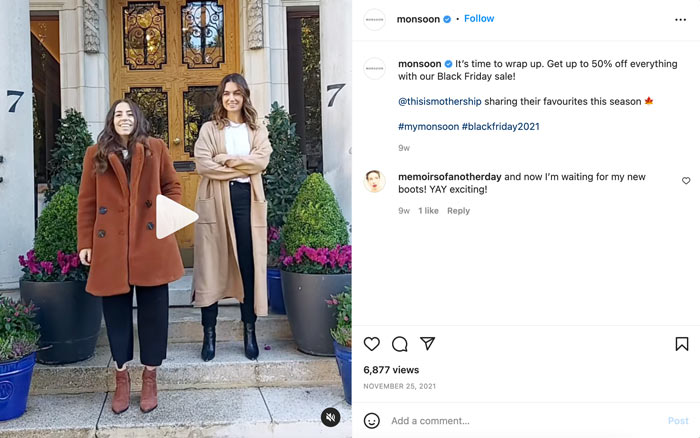
If you want to try this out, first create a hashtag for the campaign. Make sure the hashtag isn’t so complicated that users are likely to make typos when they use it, and ensure it’s easy to remember. Don’t use a hashtag that has been used before so it’s easier to find the user-generated content examples from your audience.
Create and share the hashtag and explain to users that they should use the hashtag when they wear or use your products. Consider doing a giveaway for users that tag you using the hashtag.
Finally, share the best of the UCG examples on your own social channels.
User-Generated Content Example 2: Apple
The number one thing holding brands back from using UGC? Negative feedback.
While it’s inevitable someone, somewhere, will not like you, it’s not the end of the world. In fact, you can use UGC to change the tides in your favor and create a stronger and more loyal fan base than ever before.
Take Apple as an example.
A few years ago, customers complained about the below-average camera capabilities for iPhones, especially low light photos.
To combat the onslaught of negative reviews, Apple launched its #ShotOnIphone campaign.
The goal? Use user-generated content to regain trust, improve positive brand sentiment, and awareness.
The campaign encouraged iPhone users to share their photos online and use the hashtag to get their shots featured on Apple’s Instagram page.
With 24,093,156 posts featuring the hashtag, Apple managed to regain the market’s trust, build a strong online community, and use UGC to show off the photographic capabilities of an iPhone.
To try this strategy, monitor what people are saying about your brand. If you see constructive feedback about something you can disprove or (solve!), ask users to showcase themselves using your products in a way that disproves the flack or shows your audience you’ve solved the problem.
User-Generated Content Example 3: GoPro
UGC is a great way to appeal to people’s vanity.
Recognition is one of Maslow’s hierarchy of needs, falling under esteem. By capitalizing on this with your UGC strategy, you can ensure a nearly endless stream of ad content, like GoPro.
The action-camera brand uses this strategy with its photo of the day competition. Every day the brand posts the best user-submitted photo.
With an audience of 18.8 million, the competition creates long-term engagement. GoPro customers want to get a feature and will create top-notch content to snag a spot.
For the company, it’s a never-ending supply of beautiful images at almost zero cost.
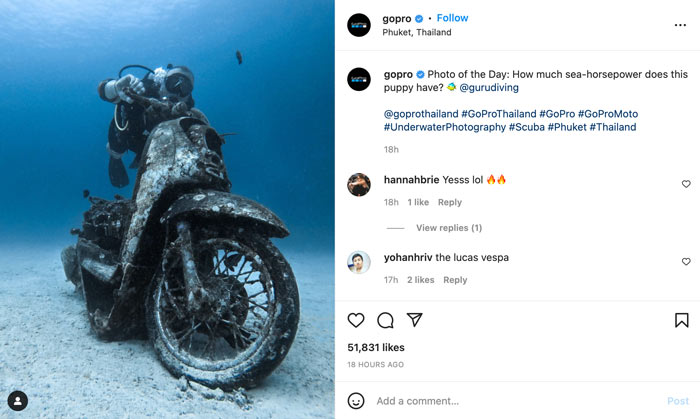
User-Generated Content Example 4: Doritos
Sometimes all you need to boost your engagement is a dash of creativity and humor.
When Doritos launched its Doritos Legions of Creator’s website, it encouraged users to create and share branded images and videos.
The best part? Creators can win prize money.
With different design challenges, the brand taps into the creative power of its audience while generating thousands of unique, evergreen, and high-quality user-generated content pieces.
Some briefs require users to create memes, design chip packets, or create delicious Doritos recipes. The campaign increases brand awareness and creates an opportunity for consumers to feel a sense of community and a strong connection to the brand.
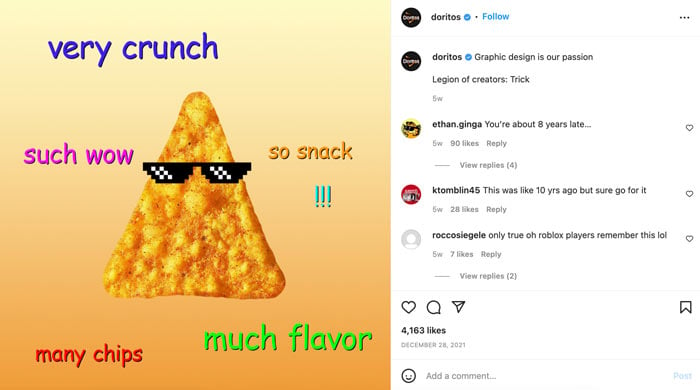
User-Generated Content Example 5: REI
Your UGC doesn’t need to feature your products. Stand out from everyone else in your industry and use your brand values to make a statement.
A few years ago, outdoor retailer REI launched an anti-Black Friday UGC campaign. Shutting down its stores nationwide, the brand encouraged its customers to swap the shopping hysteria for time outside.
Using the hashtag #OptOutside, users shared photos of themselves in nature, and the idea spread like wildfire.
Within 24 hours, the brand’s social media impressions went up by 7000 percent, and 1.4 million people spent Black Friday outdoors.
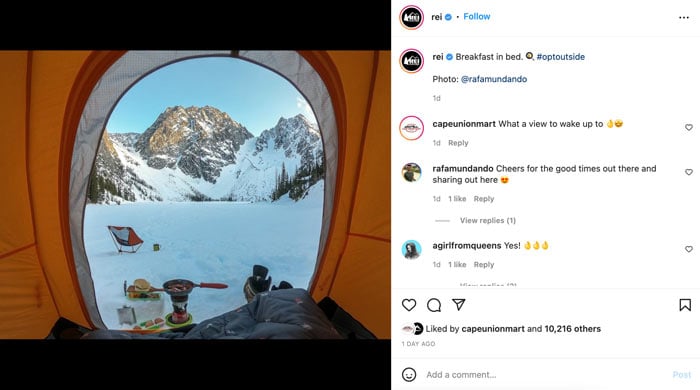
To try this out, think about your brand’s values. Then brainstorm real ways people can showcase your values out in the real world, and share them online.
User-Generated Content Example 6: Parachute
Repurposing content is one of my top digital marketing hacks. It saves you time, money, and increases the lifespan of a single image or video.
When it comes to UGC, you need to think beyond your Instagram grid feed like bedding and bath brand Parachute.
Using the hashtag #MyParachuteHome, the brand encourages consumers to show off the products in their homes. Then Parachute repurposes the photos into promotional content for emails, ads, and insert cards.

When you buy a Parachute product, you’ll get a card featuring UGC showing you how other buyers have styled it in their homes. It inspires the consumer and encourages them to show off their interior design flair.
When creating your UGC campaign, think about the consumer journey and how you can create a sharable moment that’s unique to your brand.
User-Generated Content Example 7: Aerie
With a brand identity focusing on real women and inclusivity, Aerie uses this to create UGC and an impact simultaneously.
Pledging to stop retouching swimsuit photos, the brand encourages users to do the same. For every unedited photo posted under the hashtag #AerieReal, the brand donates $1 to the National Eating Disorders Association.
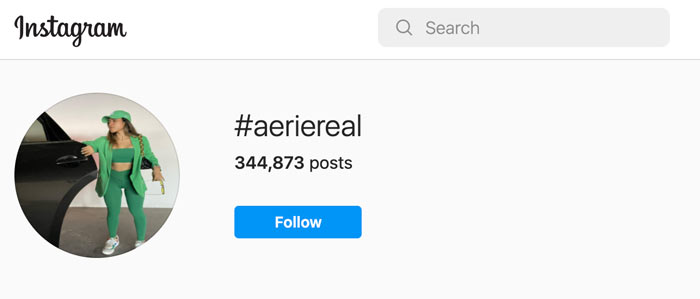
Not only does the campaign allow consumers to see what the products look like on real women, but it creates a community around body positivity and making the world a better place.
With 64 percent of consumers demanding brands take a stance on social issues, incorporating your beliefs into UGC is a powerful way to build brand loyalty, engagement, and awareness.
User-Generated Content Example 8: Glossier
Twitter UGC doesn’t only belong on Twitter.
For a powerful campaign, mix and match your content like Glossier.
The beauty brand drives engagement and community growth by sharing UGC photos, reviews, and tweets across its Instagram page.
One of the best examples is using a five-star review of Glossier’s solid perfume to announce the product’s comeback. It creates social proof, builds hype for the restock, and almost guarantees sales.
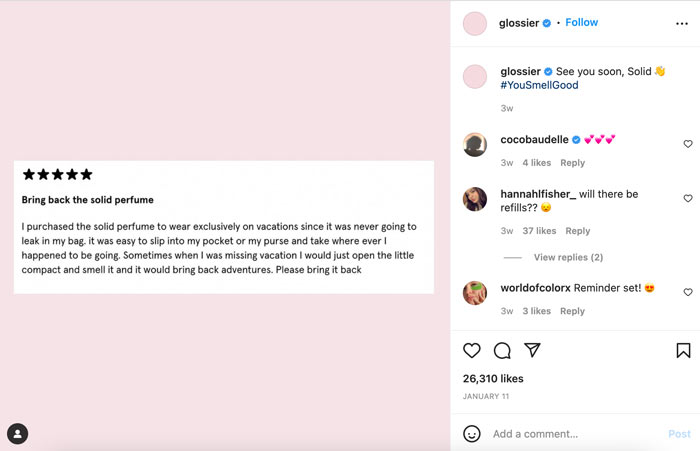
Another way Glossier incorporates reviews into its content is by reposting quotes in the caption. Instead of posting the user’s full review, the brand selected a highlight and combined it with its own brand messaging.
The result? Backing up its claims with the words of loyal customers while giving their followers a chance to step into the spotlight.
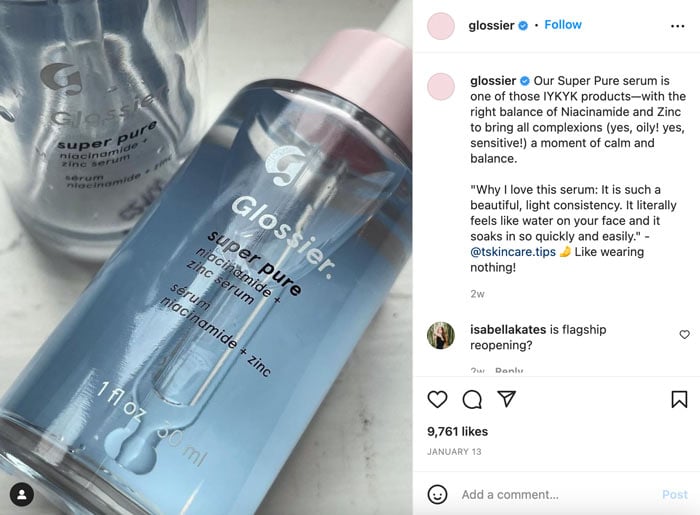
User-Generated Content Example 9: Adobe
It’s easy to show what a physical product will look like in your life, but what if you’re running a service-based business? How do you get UGC from a product that isn’t physical?
That’s a challenge Adobe tackled with its hashtag #MadeWithPhotoshop.
The campaign’s goal is to show potential customers and current users the capabilities of the software while showing off the user’s creative talents.
To date, the hashtag has been used 85,570 times, and the top submissions are used on the brand’s official Photoshop page.
By giving customers a clear idea of the kind of results they can expect, it’s a much easier sell. The incredible Photoshop submissions speak for themselves and encourage the community to take part and improve their skills.
For your next UGC, find a way to tempt your customers to show off their results. You’ll open up your community and walk away with powerful customer testimonials that prove your product or service works.
User-Generated Content Example 10: Starbucks
What’s one of the best ways to get user-generated content? Hosting a competition.
A couple of years ago, Starbucks launched the #RedCupContest. The coffee brand came up with a competition to promote its holiday-themed beverages and new red cups.
Coffee drinkers were encouraged to decorate their red cups and submit their shots to win a Starbucks gift card.
Why does this UGC campaign work so well?
It incentivizes customers to participate by offering a prize, increases brand awareness, and boosts sales because you have to buy a red cup to enter.
If you’re struggling to get UGC from your audience, offer an irresistible prize for participation. It’ll get those social media lurkers to take action, and you’ll get the content and brand engagement you’re craving.
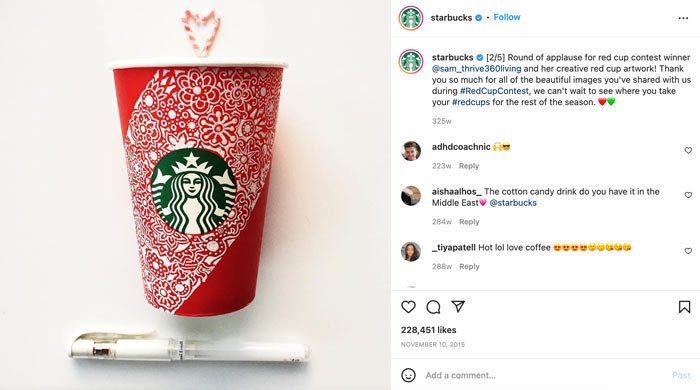
Frequently Asked Questions About User-Generated Content
Why is user-generated content important?
User-generated content is important because it builds trust between the brand and consumer. It’s based on the experience of past customers and gives potential buyers an idea of what to expect.
What are the disadvantages of user-generated content?
Some of the disadvantages of user-generated content include negative reviews or feedback, unknown or unreliable sources, and cost. You’ll need to pay someone to monitor your UGC to collect it and avoid falling victim to black hat SEO attacks.
Where can I share user-generated content?
You can share user-generated content on social media sites like Instagram and Facebook, email marketing campaigns, and landing pages.
How can I encourage users to leave more UGC?
You can encourage users to create UGC by using strong call-to-actions, hosting a UGC competition, tapping into influencer marketing, adding your social media handles to your packaging, and creating a brand hashtag.
User-Generated Content Conclusion
Empower your customers to create valuable social proof by creating touch points throughout your buyer’s journey.
Unpack your process and pull out the moments where someone is most excited about your brand or product. These are the places you want to encourage UGC and use the excitement to reach more potential customers.
Whether it’s a brand hashtag, a competition, or a shoppable gallery, the strategies described in these user-generated content examples go a long way to establish trust with your audience, create an authentic shopping experience, and drive home your brand values.
How are you going to make user-generated content part of your marketing strategy?
from Neil Patel's Digital Marketing Blog https://ift.tt/zUxZvpW

No comments:
Post a Comment